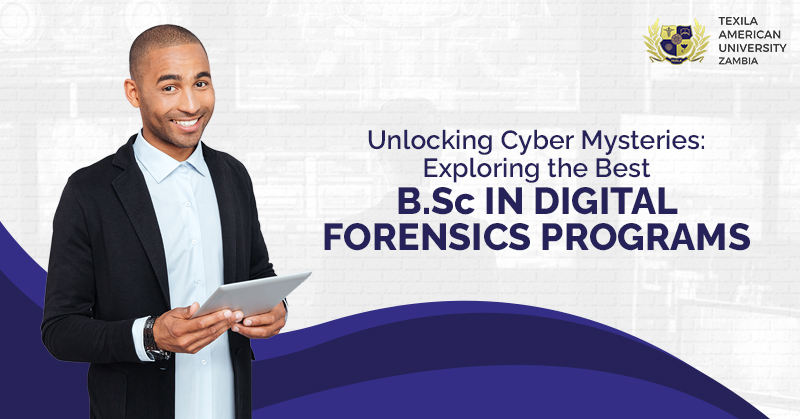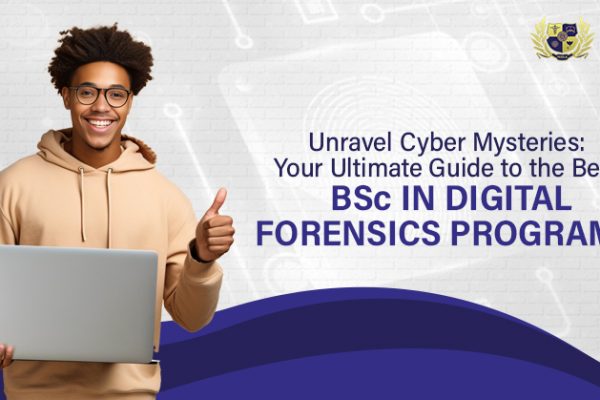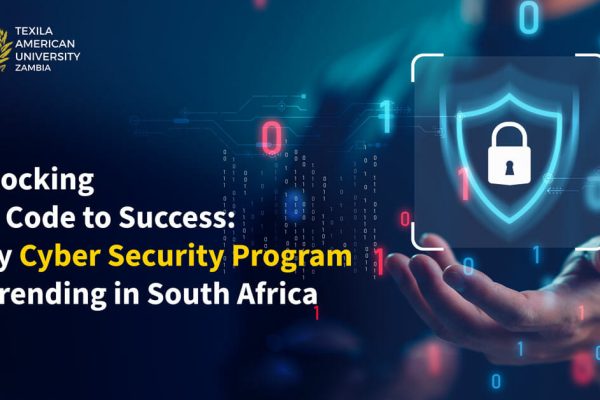|
Tired of Reading? Please listen to the blog
|
Blog Summary
In our comprehensive exploration of the best B.Sc in Digital Forensics programs, we delve into the crucial factors to consider when choosing the right educational path. From understanding the fundamental concepts of digital Forensics to highlighting the top programs worldwide, we provide insights into accreditation, curriculum, faculty expertise, and hands-on learning opportunities. Focusing on career prospects and specialized courses, we guide prospective students through the steps to enrol in these programs. Join us as we unlock the mysteries of cyber investigation and embark on a rewarding journey in Digital Forensics.
- Introduction
- Understanding Digital Forensics
- Why Pursue a B.Sc in Digital Forensics?
- Points to Consider in Choosing the Best Digital Forensics Program
- Leading Digital Forensics Courses Worldwide
- Highlighting key features and strengths of each program
- Best Digital Forensics Courses to Look For
- Steps to Enroll in a B.Sc in Digital Forensics Program
- Conclusion
- FAQs
Introduction
In today’s digitally driven world, the rise of cybercrimes has become alarming. From data breaches to online frauds, the need for skilled professionals in digital Forensics has never been more critical. This introduction will summarise the growing significance of digital Forensics in combating cybercrimes and highlight the importance of choosing the right B.Sc in Digital Forensics program.
Brief overview of the growing significance of digital Forensics in combating cybercrimes
With the proliferation of technology, cybercrimes have evolved into sophisticated threats that can compromise sensitive information and disrupt essential services. Digital Forensics is pivotal in investigating these crimes by collecting, analyzing, and preserving digital evidence. From law enforcement agencies to corporate cybersecurity teams, professionals trained in digital Forensics are in high demand to mitigate risks and protect against cyber threats. According to the FBI’s Internet Crime Complaint Center (IC3), there were over 791,000 cybercrime complaints reported in 2020 alone, resulting in losses exceeding $4.2 billion. This highlights the urgent need for skilled professionals in digital forensics to combat these threats.
Importance of choosing the right B.Sc in Digital Forensics program
As the demand for digital forensics professionals continues to rise, selecting the best B.Sc in the Digital Forensics program is crucial for aspiring students. A comprehensive and well-designed curriculum, experienced faculty members, hands-on learning opportunities, and industry connections are essential to consider when choosing a program. This guide will delve into these aspects and provide insights into the leading digital forensics degree programs worldwide.
Understanding Digital Forensics
Digital Forensics is a multidisciplinary field investigating digital devices and data to uncover evidence of cybercrimes or digital misconduct. This section will define digital Forensics, outline its scope, and elucidate the key roles and responsibilities of digital forensics professionals.
Definition and scope of digital Forensics
Digital Forensics includes various tools and methodologies for examining digital devices such as computers, mobile phones, and storage media. It entails identifying, preserving, analyzing, and presenting digital evidence in a court-admissible format. The scope of digital Forensics extends to a wide range of cybercrimes, including but not limited to hacking, data breaches, intellectual property theft, and online fraud. Recent data from the Cybersecurity and Infrastructure Security Agency (CISA) reveals that ransomware attacks have increased by 300% in the past year, underscoring the importance of digital forensics in mitigating such threats.
Key roles and responsibilities of digital forensics professionals
Digital forensics professionals are critical in investigating cybercrimes and providing evidence for legal proceedings. Their responsibilities include:
- Conducting forensic examinations of digital devices.
- Recovering deleted or encrypted data.
- Analyzing network traffic.
- Documenting findings in detailed reports.
They must possess technical skills, analytical thinking, and legal knowledge to effectively uncover evidence and support law enforcement agencies or corporate investigations.
Why Pursue a B.Sc in Digital Forensics?
Digital Forensics offers diverse career opportunities and numerous advantages for individuals with a Bachelor of Science degree. This section will explore the various career paths in digital Forensics and outline the benefits of obtaining a B.Sc in Digital Forensics.
Exploring career opportunities in digital Forensics
A B.Sc in Digital Forensics leads to numerous job prospects in the public and private sectors. Graduates can pursue roles such as digital forensic analysts, cybersecurity specialists, incident responders, forensic examiners, or consultants. They may find employment in law enforcement agencies, government organizations, cybersecurity firms, financial institutions, or corporate security departments. The demand for digital forensics professionals is expected to grow as cyber threats continue to evolve, Making it a lucrative and rewarding career prospect. According to the U.S. Bureau of Labor Statistics (BLS), employment of information security analysts, including digital forensics professionals, is projected to grow 31% from 2020 to 2030, much faster than the average for all occupations.
Advantages of obtaining a Bachelor of Science degree in Digital Forensics
Earning a B.Sc in Digital Forensics equips students with specialized knowledge and practical skills highly valued in cybersecurity. The comprehensive curriculum covers computer forensics, network forensics, malware analysis, and forensic data analysis, providing students with a solid foundation in digital investigation techniques. Additionally, the program’s hands-on learning experiences, internships, and industry certifications enhance students’ employability and prepare them for real-world challenges. Moreover, a B.Sc degree demonstrates to employers that graduates have acquired the necessary expertise to excel in digital Forensics, giving them a competitive edge in the job market.
Points to Consider in Choosing the Best Digital Forensics Program
When selecting a B.Sc in Digital Forensics program, prospective students should consider various things to ensure they choose a curriculum that matches their career goals and desires. This section will outline critical considerations such as accreditation, curriculum structure, faculty expertise, hands-on learning opportunities, and alumni success.
Accreditation and recognition of the program
One of the first factors to consider when evaluating digital forensics programs is the accreditation and recognition of the institution. Accreditation ensures that the program adheres to accurate academic requirements and is recognized by employers and industry organizations. Students should opt for programs endorsed by reputable accrediting bodies such as ABET (Accreditation Board for Engineering and Technology) or institutions recognized by regional accrediting agencies. Additionally, professional organizations support programs, including the International Association of Computer Investigative Specialists (IACIS) or CISA (Cybersecurity and Infrastructure Security Agency). Further, validate the program’s quality. Research conducted by the Council for Higher Education Accreditation (CHEA) indicates that graduates from accredited programs are more likely to secure employment and command higher salaries in the workforce.
Curriculum structure and course offerings
The curriculum structure and course offerings play a crucial role in shaping students’ educational experience and preparing them for careers in digital Forensics. A well-designed curriculum should cover a broad range of relevant topics, including forensic techniques, digital evidence handling, legal and ethical issues, and emerging trends in cybersecurity. Core courses should provide a solid theoretical foundation; Elective courses enable students to specialize in areas of interest such as mobile Forensics, cloud forensics, or incident response. Furthermore, programs incorporating hands-on labs, case studies, and practical exercises enable students to apply theoretical concepts in real-world scenarios, enhancing their learning experience and skill development.
Faculty expertise and industry connections
Faculty skills and qualifications impact the quality of instruction a digital forensics program provides. Students should research faculty members’ academic backgrounds, professional experience, and research interests to ensure they are well-equipped to deliver high-quality instruction and mentorship. Additionally, programs that maintain strong connections with industry partners, law enforcement agencies, and cybersecurity organizations offer valuable networking opportunities, internships, and guest lectures, exposing students to the latest industry practices and trends.
Hands-on learning opportunities and internships
Hands-on learning opportunities are essential for developing practical skills and gaining real-world experience in digital Forensics. Programs that offer access to state-of-the-art forensic laboratories, specialized software tools, and simulated crime scenes allow students to conduct authentic forensic investigations and hone their technical abilities. Furthermore, internships or cooperative education programs provide students with valuable hands-on experience working alongside professionals in the field, enabling them to apply classroom knowledge to real-world scenarios, build professional networks, and explore career pathways.
Alum success and networking opportunities
The success of alums and the strength of alum networks can provide valuable insights into the reputation and effectiveness of a digital forensics program. Prospective students should research the career trajectories of alums, including their employment outcomes, job placements, and professional achievements. Alum networks can also serve as valuable resources for current students, offering mentorship, career advice, job opportunities, and networking events. Programs that facilitate alum engagement through alums associations, industry partnerships, or networking platforms create a supportive community where students can learn from the experiences of successful professionals and establish connections that can benefit their future careers.
Leading Digital Forensics Courses Worldwide
The domain of digital Forensics is constantly evolving, with universities worldwide offering specialized B.Sc in Digital Forensics programs to meet the growing demand for skilled professionals. This section provides an overview of prominent universities offering leading digital forensics courses.
Overview of leading universities offering B.Sc in Digital Forensics programs
- University of Maryland, Baltimore County (UMBC)
- Purdue University
- University of Central Florida (UCF)
- Carnegie Mellon University
- Champlain College
- George Mason University
- University of New Haven
- DeSales University
- Sam Houston State University
- University of South Alabama
Highlighting key features and strengths of each program
University of Maryland, Baltimore County (UMBC)
- UMBC provides a bachelor’s degree in computer science focusing on Digital Forensics and Cybersecurity.
- The program blends theoretical knowledge and applied skills through hands-on labs, research projects, and internships.
- Faculty members are renowned experts in the field, actively engaged in research and industry collaborations.
- UMBC’s location in the Baltimore-Washington metropolitan area provides access to several internship and career possibilities with government agencies, defence contractors, and cybersecurity firms.
Purdue University
- Purdue University’s Computer and IT Department provides a BSc in Cybersecurity and Digital Forensics course.
- The program emphasizes a multidisciplinary approach, incorporating computer science, criminal justice, and forensic science coursework.
- Students can access state-of-the-art forensic laboratories and cybersecurity research facilities, including the Purdue Cyber Forensics Lab.
- Purdue’s strong industry connections and partnerships with leading cybersecurity firms offer students valuable internship and career opportunities.
University of Central Florida (UCF)
- UCF offers a Bachelor of Science in Digital Forensics program through the Department of Computer Science.
- The program covers various topics, including computer crime investigation, digital evidence analysis, and forensic tool development.
- UCF’s Digital Forensics Research Lab provides students with hands-on experience conducting forensic investigations and developing cutting-edge technologies.
- UCF’s location in Orlando, a hub for cybersecurity and technology companies, offers students access to internship and job opportunities with industry leaders.
Carnegie Mellon University
- Carnegie Mellon University provides a Bachelor of Science in Computational Biology focusing on Digital Forensics and Security.
- The program combines computer science, biology, and forensic science to address complex digital Forensics and cybersecurity challenges.
- Students can work on interdisciplinary research projects and collaborate with faculty members from various departments.
- Carnegie Mellon’s reputation for excellence in technology and innovation gives students a competitive advantage in the job market.
Champlain College
- Champlain College provides a Bachelor of Science in Computer and Digital Forensics program through the Information Technology and Sciences Division.
- The program provides students with a comprehensive understanding of computer forensics, network security, and incident response.
- Champlain’s Upside-Down Curriculum allows students to dive into major-specific courses from the first semester, gaining hands-on experience early in their academic journey.
- Champlain’s partnerships with industry leaders and government agencies offer students internships and cybersecurity and digital forensics job opportunities.
Best Digital Forensics Courses to Look For
Core courses essential for a comprehensive understanding of digital Forensics
- Introduction to Digital Forensics
- Computer Forensics Fundamentals
- Network Forensics and Incident Response
- Forensic Data Analysis and Interpretation
- Legal and Ethical Issues in Digital Forensics
Specialized electives to tailor the degree according to career goals
- Mobile Device Forensics
- Cloud Forensics and Virtualization
- Malware Analysis and Reverse Engineering
- Forensic Accounting and Financial Investigations
- Cybercrime Law and Policy
Steps to Enroll in a B.Sc in Digital Forensics Program
Enrolling in a Bachelor of Science in Digital Forensics program requires careful planning and preparation. This section will outline the steps in researching potential universities and programs, understanding admission requirements, and preparing a standout application.
Researching potential universities and programs
- Identify universities offering Bachelor of Science in Digital Forensics programs that match your academic and professional objectives.
- Research each program’s curriculum, faculty expertise, industry connections, and alums success to assess its suitability.
- Attend virtual information sessions, open houses, or campus tours to learn more about the programs and interact with faculty members and current students.
- Seek guidance from academic advisors, career counsellors, or professionals to help narrow your options and make informed decisions.
Understanding admission requirements and the application process
- Review the admission requirements for each program, including academic prerequisites, standardized test scores, and application deadlines.
- Include application materials such as transcripts, letters of recommendation, personal statements, and resumes highlighting your academic accomplishments, relevant experience, and interest in digital Forensics.
- Take standardized tests, such as the SAT or ACT, if required by the universities you’re applying to, and ensure that your scores meet or exceed the minimum requirements.
- Please submit your applications online through the universities’ admissions portals and track the status of your applications regularly to ensure they are complete and submitted on time.
Tips for preparing a standout application
- Tailor your statement or essay to each program, highlighting your specific interests, experiences, and goals related to digital Forensics.
- Showcase relevant skills and experiences, such as internships, research projects, competitions, or certifications, demonstrating your passion for the field and readiness for academic rigour.
- Ask for letters of recommendation from teachers, mentors, or superiors who can attest to your academic abilities, character, and potential for success in digital Forensics.
- Proofread your application materials carefully for grammatical errors, typos, and formatting issues, and seek feedback from trusted advisors or mentors to ensure they are polished and professional.
Conclusion
In conclusion, they are choosing the best B.Sc in the Digital Forensics program is essential for aspiring professionals seeking a rewarding cybersecurity and digital investigations career. By considering factors such as accreditation, curriculum structure, faculty expertise, hands-on learning opportunities, and alumni success, potential students can make informed decisions and set themselves up for success in the dynamic field of digital Forensics. With the increasing prevalence of cybercrimes and the growing demand for skilled professionals, A report by Cybersecurity Ventures predicts that there will be 3.5 million unfilled cybersecurity jobs globally by 2025, highlighting the immense opportunities available for graduates with expertise in digital forensics.
Pursuing a Bachelor of Science degree in digital Forensics opens doors to diverse career opportunities and positions graduates for long-term success in the ever-evolving cybersecurity landscape. As technology develops and cyber threats become more sophisticated, the need for trained digital forensics experts will only grow, making it an exciting and promising field for aspiring professionals to explore and excel in.











